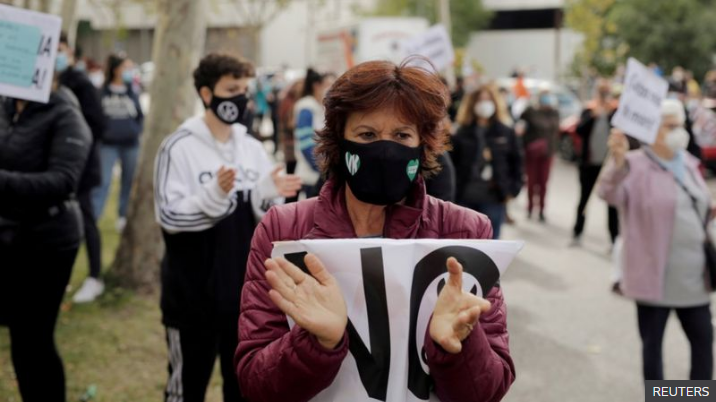InternationalNews
Coronavirus: Spain imposes state of emergency on Madrid

The Spanish government has ordered a 15-day state of emergency to bring down Covid-19 infection rates in the capital, after a court overturned a partial lockdown imposed a week ago.
Madrid and nearby cities will see restrictions enforced by 7,000 police.
The capital has been at the centre of a political row, with the centre-right city authorities challenging the Socialist-led government’s demands.
Cases are down and a state of emergency is unjustified, say city officials.
Madrid health minister Enrique Ruiz Escudero insisted that measures already in place were working and that the national government order was “a measure no Madrileño will understand”.
Late last Friday, all non-essential movement in and out of Madrid and the other nine cities was banned, despite the opposition of local authorities, led by regional president Isabel Díaz Ayuso.
When the Madrid authorities’ court challenge was successful on Thursday night, Prime Minister Pedro Sánchez invoked constitutional powers he used to impose the original lockdown in March.
He moved quickly ahead of a holiday weekend, with Spaniards celebrating their national day on Monday.
Ms Ayuso appealed for a delay, but the prime minister was adamant “public health must be protected now”.
Spain’s health minister Salvador Illa bitterly criticised Ms Ayuso’s approach. “The president of the Community of Madrid has decided to do nothing. Patience has its limits,” he told reporters.
The order, in Spanish a “state of alarm”, is not remotely as severe as the lockdown imposed in March. It brings back into force the measures brought in a week ago that were lifted by the court late on Thursday:
The measures, set to come into force at around 16:00 (14:00 GMT), affect 4.78 million people in Madrid and cities such as Fuenlabrada, Getafe and Leganés.
Ahead of a long holiday weekend, with many people planning to leave the capital, it was unclear how that might be reinforced. However, the interior minister said some 7,000 security forces would be deployed around the city to ensure measures were respected.
How bad is Madrid’s outbreak?
When the partial lockdown was imposed, Spain’s government singled out areas with an infection rate higher than 500 cases for every 100,000 residents.
Last week it was far higher than that in Madrid, with at least 723 infections, but that has since fallen to closer to 500.
Source:Fiilafmonline/BBC



